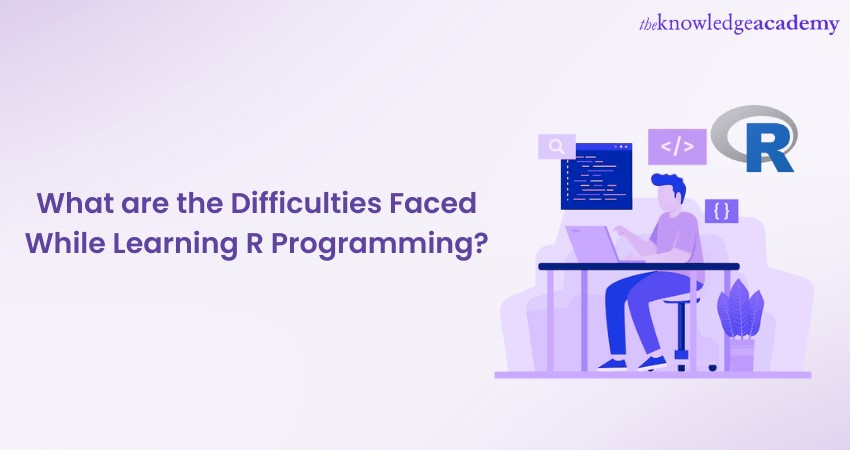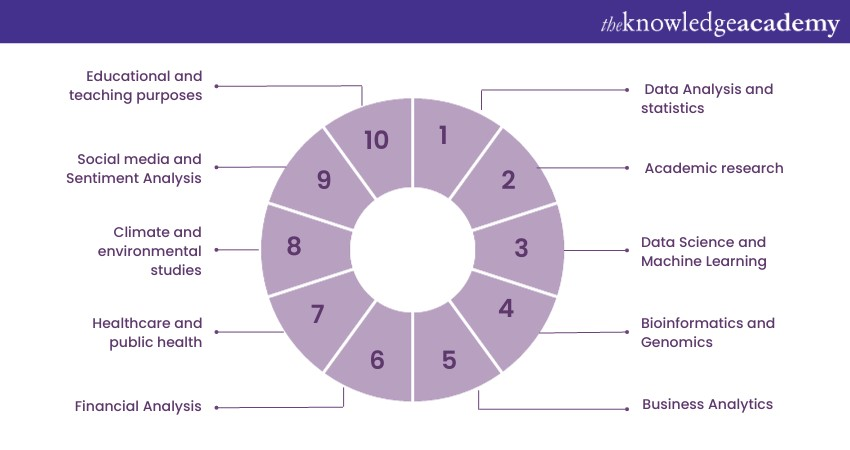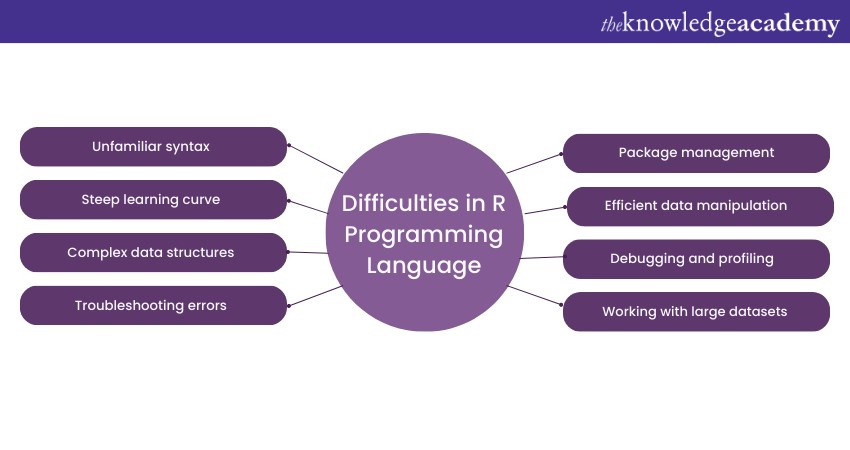We may not have the course you’re looking for. If you enquire or give us a call on 01344203999 and speak to our training experts, we may still be able to help with your training requirements.
We ensure quality, budget-alignment, and timely delivery by our expert instructors.

R programming has gained immense popularity among data scientists, statisticians, and analysts due to its powerful capabilities in data manipulation, visualisation, and statistical analysis. Unfortunately, with every new programming language you try to learn, you will face some difficulties.
When you first start learning the R programming language, you will observe that it is a bit more difficult to learn than the other programming languages. If you have a prior programming language, it will take approximately two weeks to learn. However, if you are an amateur in the programming world, you might take somewhere around four to eight weeks to learn this language. So, how difficult is R Programming language?
If this is your question, then you have come to the right blog. Here, we will learn the factors that make R Programming language a hard language to learn. Explore this blog further to gain a better insight into the R Programming language.
Table of Contents
1) What do you understand by R Programming?
2) Why is R Programming difficult to learn?
a) Unfamiliar syntax
b) Steep learning curve
c) Complex data structures
d) Troubleshooting errors
e) Package management
f) Efficient data manipulation
g) Debugging and profiling
h) Working with large datasets
i) Statistical concepts
j) Visualisation complexity
k) Dealing with missing data
l) Lack of hands-on practice
m) Community and resource accessibility
3) Where is the R Programming Language used?
4) Conclusion
What do you understand by R Programming?
Before we dive into discussing the difficulties faced during R programming, let us first briefly explore this programming language. R programming is an open-source language and environment for statistical computing and data analysis. With its extensive package ecosystem and support for statistical methods, the features of R programming make it well-suited for data manipulation, visualization, and modeling.
Its interactive nature allows for rapid prototyping and real-time data analysis. R's emphasis on reproducible research ensures transparency in data analysis workflows. These aspects contribute to the overall discussion of the Advantages of R Programming, making it suitable for a wide range of applications in academia and industry. This includes academic research, business analytics, and data-driven decision-making.

Gain an in-depth knowledge of this programming language with our R Programming Course.
Why is R Programming difficult to learn?
Now, we have a brief idea of how difficult R Programming language is. Let us now discuss why it is difficult to learn the R Programming language:
a) Unfamiliar syntax:
One of the primary difficulties for beginners in R programming is adapting to its unique syntax. The use of symbols like "<-" for assignment, instead of the conventional "=" and the prevalence of functions like "apply" and "lapply" can be confusing for newcomers. This unfamiliarity can lead to syntax errors and hinder code comprehension.
b) Steep learning curve:
R is a rich and extensive language with a plethora of libraries and packages. Aspiring learners, like you, may find the vastness overwhelming. This makes it more challenging for you. You have to know where to start and what aspects to focus on. The learning curve can appear daunting, requiring persistence and patience.
c) Complex data structures:
R supports various data structures such as vectors, matrices, data frames, and lists. Understanding the nuances of each structure and effectively manipulating them can be a stumbling block, especially for you if you have limited programming experience.
d) Troubleshooting errors:
Dealing with errors and debugging code is an inevitable part of programming. However, deciphering R's error messages and identifying the root cause can be perplexing for beginners, hindering the learning process.
e) Package management:
R's package ecosystem is vast, providing users like you with access to a plethora of tools and functionalities. However, managing and installing packages, handling dependencies, and updating Rlang along with other essential packages can pose challenges if you are just starting out.
f) Efficient data manipulation:
R offers several ways to manipulate data, including loops, apply functions, and dplyr. Choosing the most efficient method for a given task can be confusing, and you may struggle to optimise your code.
g) Debugging and profiling:
Efficient debugging and profiling are essential skills, if you are aiming to be proficient in R programming language. Learning how to identify performance bottlenecks and optimise code can be time-consuming and difficult for you in the beginning.
h) Working with large datasets:
Handling large datasets in R can be resource-intensive and may lead to performance issues. You may need to explore techniques like data chunking, parallel processing, or using external memory approaches to work with extensive data.
i) Statistical concepts:
R is widely used for statistical analysis. Understanding statistical concepts is crucial for meaningful data analysis. If you do not have a strong statistical background, comprehending and applying statistical methods in R can be challenging.
j) Visualisation complexity:
If you can create insightful and visually appealing plots and charts, it is a valuable skill in data analysis. However, R's extensive visualisation libraries, such as ggplot2, can be intricate for you to master if you are just starting out.
k) Dealing with missing data:
Real-world datasets often contain missing values, and effectively handling them is vital for accurate analysis. R's approach to handling missing data can be intricate. Approaching this intricacy may require you to explore imputation techniques.
l) Lack of hands-on practice:
Reading tutorials and watching videos can only take you so far. The absence of hands-on practice and real-world projects can hinder the practical application of knowledge, making it difficult to grasp concepts thoroughly.
m) Community and resource accessibility:
Access to a supportive community and learning resources is essential for you. Depending on individual learning preferences, some may find it difficult to find the right forums, tutorials, or mentors to facilitate their learning journey.

Level up your coding game with PHP Programming Course.
Where is the R Programming Language used?
The adaptability and community-driven development of R have made it a preferred tool for data-centric tasks, research, and decision-making across diverse industries and academic domains. Its continued growth and widespread usage ensure its position as a powerful programming language in the world of data analysis and statistical computing.
So, no matter the difficulty level, R Programming is still used for various purposes. Let's have a look at it:
a) Data analysis and statistics: R is a go-to choice for statisticians and data analysts to explore and analyse datasets. Its extensive statistical libraries and visualisation capabilities make it ideal for conducting hypothesis testing, regression analysis, time series analysis, and more.
b) Academic research: R is widely used in academia for research across disciplines, including social sciences, life sciences, economics, and environmental studies. Its ability to handle complex statistical analyses and produce publication-quality visualisations makes it invaluable for research projects.
c) Data science and machine learning: R's powerful machine learning libraries, such as Caret and randomForest, have made it popular in the field of data science. It is employed for tasks like predictive modelling, clustering, classification, and natural language processing.
d) Bioinformatics and genomics: R's Bioconductor project offers specialised packages for analysing biological data, making it an indispensable tool for bioinformaticians and researchers in genomics, proteomics, and drug discovery.
e) Business analytics: R's capabilities in data manipulation and visualisation are well-suited for business analytics, enabling professionals to make data-driven decisions, conduct market research, and perform customer segmentation.
f) Financial analysis: R is used in finance for risk assessment, portfolio optimisation, and financial modelling. Its packages, like quantmod and xts facilitate analysing financial time series data.
g) Healthcare and public health: R is employed in epidemiology, healthcare analytics, and disease modelling. Its ability to handle large healthcare datasets and perform statistical analyses is beneficial for medical research.
h) Climate and environmental studies: R is used to analyse climate data, environmental monitoring, and ecological modelling. Its visualisation capabilities help present complex environmental data effectively.
i) Social media and sentiment analysis: R is applied in sentiment analysis, where it mines social media data to gauge public opinion and sentiment.
j) Educational and teaching purposes: R's open-source nature and rich learning resources make it an excellent choice for teaching statistics and data analysis at universities and educational institutions.
Conclusion
So, if you are interested in learning this programming language, you must remember that even though it is hard to learn, R programming language is used for a plethora of purposes. Its applications and capabilities have solidified its position as a powerful and indispensable tool in the realm of data analysis, statistics, and research. Despite its challenges and complexities, R's extensive package ecosystem, statistical functionalities, and visualisation capabilities make it a preferred choice for statisticians, data scientists, researchers, and analysts. From academia to industry, R continues to thrive in various domains, contributing significantly to data-driven decision-making and insightful research.
Understand how Python, along with R Programming language, can help you find a solid footing in the programming world with our Python Programming Training.
Frequently Asked Questions
Upcoming Programming & DevOps Resources Batches & Dates
Date
 R Programming Course
R Programming Course
Fri 28th Feb 2025
Fri 4th Apr 2025
Fri 27th Jun 2025
Fri 29th Aug 2025
Fri 24th Oct 2025
Fri 5th Dec 2025






 Top Rated Course
Top Rated Course



 If you wish to make any changes to your course, please
If you wish to make any changes to your course, please


